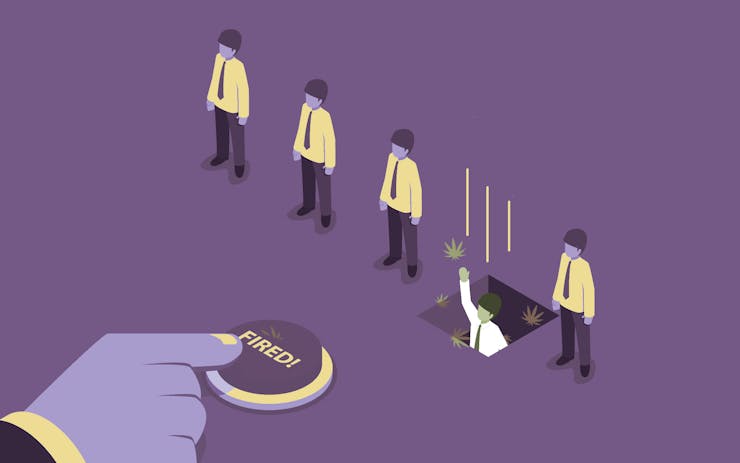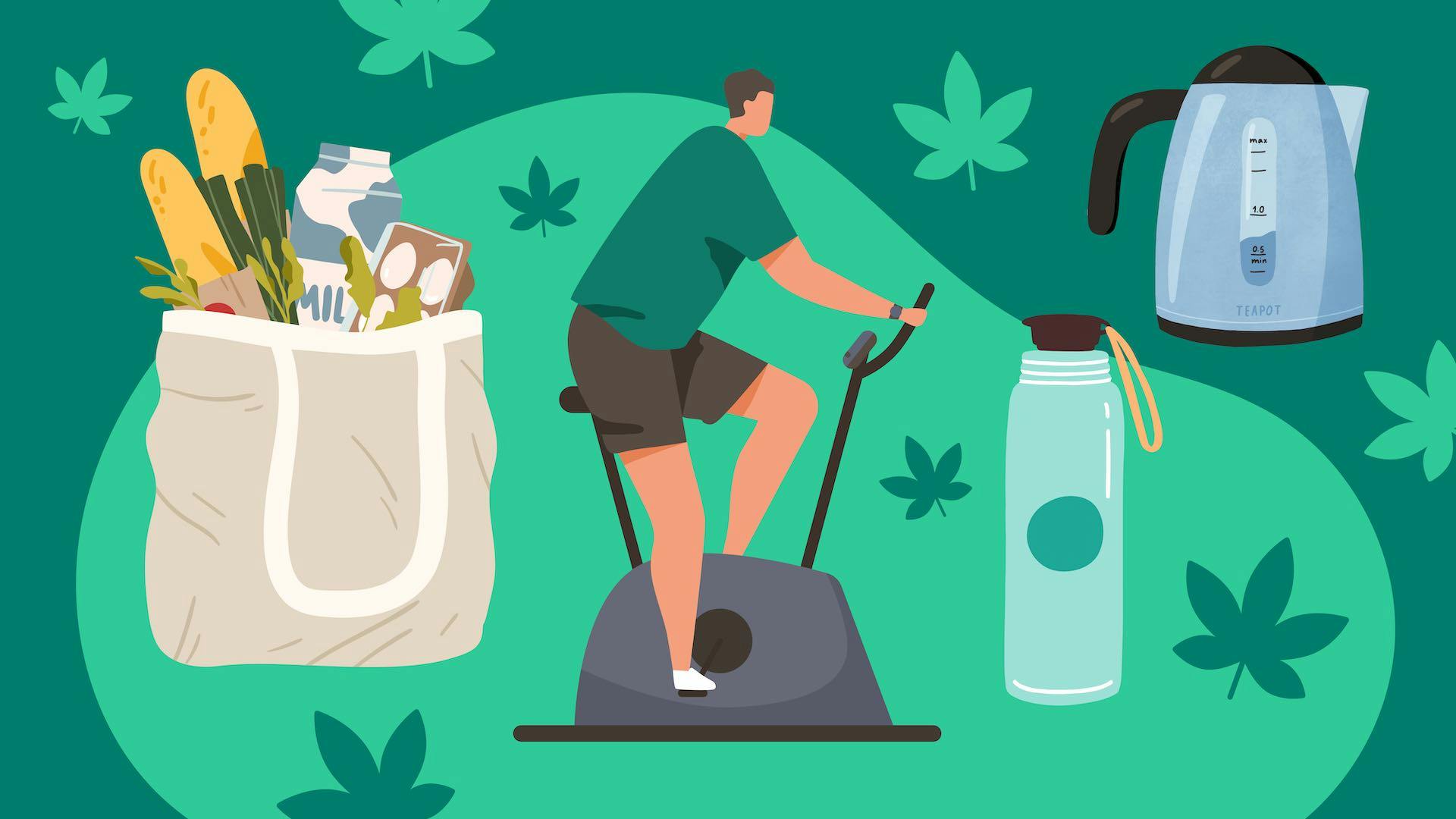A forklift operator with chronic pain who declined to take a drug test. A van driver hit by an uninsured motorist. A fast-food supervisor who slipped and fell on the job.
All of these workers fired. And all were terminated because of cannabis—in states where the drug is legal.
Whether for medical or adult use, high-THC cannabis is now permitted in some form in more than 30 states. Of those, only about a dozen offer some form of explicit protection for employees who legally use medical cannabis off-duty. Everywhere else, employers have the right to drug test and fire employees for medical marijuana use, even if it is legal. And not a single recreational consumer anywhere has legal protections from termination.
“It was my number-one call after Prop. 64 passed: ‘I’m drug-tested on my job. Am I legal now?’”
The threat of being denied or losing employment is a barrier to full marijuana legalization and acceptance, and a key difference that sets cannabis apart from other legal drugs like alcohol, nicotine, and prescribed pharmaceuticals.
And the workplace question weighs heavily on consumers’ minds, often causing mass confusion when a state goes legal.
“It was my number-one call after Prop. 64 passed,” said Ellen Komp, the deputy director for California NORML: “‘I’m drug-tested on my job. Am I legal now?’”
The answer, largely, is no. And there have been real consequences. According to a survey of 400 people conducted by California NORML after the measure passed, nearly 30% said they’d been either been denied employment or terminated because they tested positive for medical cannabis. Another 45.6% said they were afraid of losing a job opportunity for using legal medical marijuana, Komp said.
Even if a worker has been performing well and has consistently been sober on the job, they can be fired if a drug test turns up positive—with no recourse other than going to court. And litigation, which can be costly, isn’t always an option for the freshly unemployed.
“You run a real risk by simply talking about” cannabis, said Michael Subit, a Seattle-based attorney who has argued before the Washington state Supreme Court on behalf of workers fired for legally using marijuana.
Scant Protection for Patients
Prior to 2017, nearly every court decision regarding workers fired for using cannabis sided with the employer. In Colorado, for example, a 2015 state Supreme Court decision held that a state law barring employers from firing workers for legal, off-duty cannabis use was invalid because the drug remains illegal under federal law. Courts in California, Washington, Montana, and other states have issued similar rulings.
Efforts to extend protections to workers who use cannabis medicinally have been fought off—usually by lobbies for employers.
But during the past year, with a few notable exceptions, courts have appeared more willing to accommodate cannabis use—at least by medical marijuana patients.
In May 2017, a Rhode Island superior court ruled that firing a registered medical marijuana patient for failing a drug test violated antidiscrimination laws. Two months later, the Massachusetts Supreme Court ruled that workers can’t be fired merely for using medical cannabis, creating precedent for workers and employers statewide. There are exceptions, of course—the ruling doesn’t protect on-the-job consumption or impairment, nor does it apply to non-patients or workers in safety-sensitive jobs, such as pilots or truck drivers—but it was a novel victory for patient-rights advocates.
Shop highly rated dispensaries near you
Showing you dispensaries near“I can’t stress this enough,” Dale Deitchler, an employment attorney and expert on cannabis in the workplace, said at the time. “It’s the first case of its kind in the country.”
But victories in the courts for marijuana users’ rights have not been followed up with explicit protections in the law.Are You One of the Lucky Ones?
A Lawmaker’s Dilemma
Politics are the primary reason why worker protections are missing from most legalization and medical marijuana laws. Efforts to extend protections to workers who use cannabis medicinally have been fought off—usually by lobbies for employers.
In 2008, the California Supreme Court ruled that Prop. 215, that state’s initial medical marijuana law, did not offer explicit protections for employees using cannabis off the job. (That case, Ross v. Raging Wire, quickly became famous precedent).
In response, the state Legislature later that year passed a bill offering those protections. Then-Gov. Arnold Schwarzenegger vetoed the bill. Observers said at the time that opposition from the state Chamber of Commerce figured heavily in the veto.
“This is largely going to be driven by the changing social acceptance of cannabis use and the culture surrounding it—which we’re already seeing taking place.”
In 2010, the Chamber also opposed a marijuana legalization ballot measure, Prop. 19, in part because it offered workers such protections. Prop. 19 failed. The state’s successful marijuana legalization measure, Prop. 64, which passed in 2016, did not include such protections.
This spring, yet another bill that would have offered California medical marijuana patients employment protections died in committee. It won the endorsement of both labor unions and cannabis advocacy groups, but it was opposed yet again by major employers, including lobby groups for winemakers and restaurants as well as the Chamber of Commerce, which argued that “an employer has the right to maintain a drug-free workplace, within certain parameters.”
Cannabis Is Legal in California. Here’s Where to Find It.
This decadelong saga illustrates why some legalization measures don’t include employment protections to begin with—to avoid entities like the Chamber of Commerce “claiming it allows people to use marijuana on the job, and prohibits employers from any form of recourse,” explained Mason Tvert, the Colorado-based spokesman for the Marijuana Policy Project.
Only a single state where recreational cannabis is legal protects adult users from losing their jobs for legal cannabis use.
“We certainly don’t think adults should be punished for using a less harmful substance than alcohol,” Tvert says. “But the fact remains, in some states, you can be fired for using alcohol. This is largely going to be driven by the changing social acceptance of cannabis use and the culture surrounding it—which we’re already seeing taking place.”
In the 15 legal states that do offer some level of security against termination for employees legally using medical marijuana, most of the protections are extremely limited.
Generally, states can’t refuse to hire or discharge a qualified medical marijuana patient “solely for that person’s status as a qualifying patient,” in the words of Maine’s law.
And, well, that’s about it. Nothing in states’ worker protections “require an employer to accommodate the medical use of marijuana in any workplace,” as Rhode Island law puts it.
Find Medical Marijuana in Maine and Rhode Island
That means if a patient possessed or used marijuana on the job—or if an employer determines that marijuana use could lead to the loss of a federal benefit—that worker can be summarily fired. And none of these protections apply in places where marijuana possession is restricted or outlawed under legalization laws, such as school campuses.
If protections for cannabis patients are thin, for recreational consumers they’re virtually nonexistent. Only a single state where recreational cannabis is legal protects adult users from losing their jobs for legal cannabis use: Maine, where the state’s voter-approved 2016 legalization law prevents most employers from firing a worker for off-the-clock consumption. However given the nature of cannabis testing, it can be difficult to determine precisely when consumption occurred.
Meanwhile, drug-free workplace laws, legacies of the drug war’s Just Say No era, give employers significant power to compel employees to submit to drug tests.
If you show up to work stoned, forget it—your employer has every right to give you your parting papers. But your protections are nil even if you show up on time and clear-headed: Testing for cannabis involves looking for THC metabolites that can remain in the body for days or weeks after impairment.
And, depending on your job classification, you may have zero protections whatsoever—even as a medical patient. Workers in so-called “safety designated” positions, which includes jobs like law enforcement officers and operators of heavy equipment such as forklifts, operators of trains and buses, and law-enforcement officers, are all exempt from what protections exist. (That was one of the key issues that led a federal judge to rule against a terminated New Jersey forklift operator who claimed his employer was aware he used medical cannabis to treat an old work injury.)
Proceed With Caution
In absence of such protections, marijuana users worried about losing a job or not getting hired have three options, employment attorneys and marijuana advocates say. None of them is ideal.
First, they can hide their marijuana use from their employer. This may be difficult, however, as many employers do routinely drug test, either for pre-employment screening, or following an on-the-job “incident” like a fall or a vehicle crash.
Second, they can find an employer with a workplace culture that doesn’t see off-duty cannabis use as an issue. That, of course, is contingent on the worker being skilled or privileged enough to be picky about where they work.
Third—and the least-tenable option, especially with people who use cannabis medicinally—they can quit using cannabis altogether.
Subit, the Seattle-based attorney, says trying to use medical marijuana legally without being fired “is a more dramatic example of what any employee who needs accommodation for a disability faces.”
“Any employee who is concerned that it’s going to be used against them should not raise that initially as part of a job application,” he told Leafly. “And an employer should not ask you initially.”
“Quite frankly,” he added, “you’re probably better off not telling your employer, unless you really trust them.”
Possibly the most prominent example of an employer openly declaring safe harbor for cannabis users was former FBI Director James Comey’s advice for cannabis users to “go ahead and apply” for cybersecurity jobs with the agency.
Other less-incongruous examples of employers realizing they could no longer afford to be picky can be found in Denver, where low unemployment and a worker shortage—more important than the local vibrant recreational marijuana industry—means employers can no longer afford to be so picky.
Washington may be the first state to offer explicit protections to recreational marijuana users smoking in their off-hours, regardless of what accommodations an employer wants to make.
A bill that would have protected recreational users from termination solely for a positive marijuana test was introduced in the state legislature earlier this year. It died in committee, but sponsors have vowed to try again (and with a legislature that, based on primary results, looks to be more progressive).
Until then, Subit’s advice for those concerned about their jobs? “I’d keep my mouth shut about it.”
Correction: An earlier version of this story failed to mention Maine’s statutory protections for workers who consume cannabis outside of work.
This story was updated Aug. 30, 2019.






